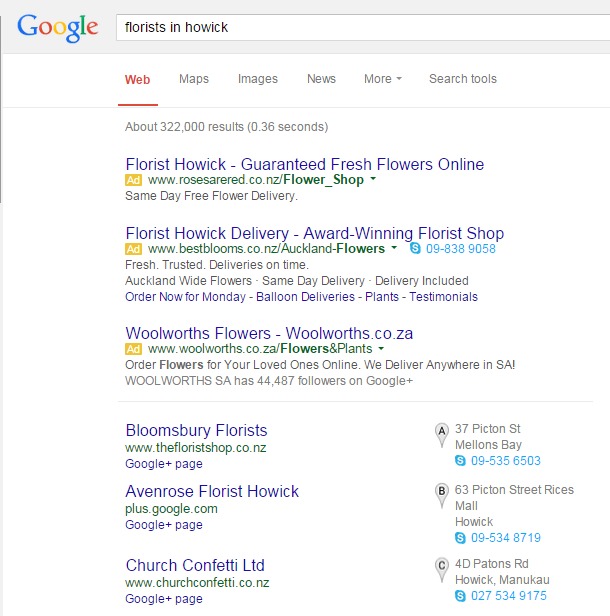DW Tips
The Power of Local Search
Jun 6, 2015 by Paul Websites don't sell themselves, they have to be marketed.
Websites don't sell themselves, they have to be marketed.
However, there are something like 800 million live websites globally, which is a lot of noise to get lost in, and with so many brokers selling a whole variety of 'digital marketing' and search engine optimisation (SEO) services the world of online marketing can look a bit like the Wild West.
However, for many businesses there is a very simple, powerful and low cost way to market your website by taking advantage of local searches and combining Google My Business with local search optimisation.
Local Search
Let's say you're a local business, such as a florist. Your target market is most likely going to be people living in the local area, or people who are wanting to send flowers to someone in the local area. Equally, most people who are searching the internet for a florist will be looking for a local florist, and their search is likely to be something like 'florists in Howick'. In this case, you should register your business with Google My Business. When you register your business with Google My Business, you’ll create a Google+ page. From there you can add your business to Google Maps and create brand pages on Google+.
What's the benefit of doing this? Well, because Google loves local searches. Businesses that are registered with Google My Business and which match the local search phrase will find their listing appearing after the paid Google Ads and before the organic search results. So for no money and very little effort, your business can appear high up on the first page of Google for local searches.
See the example below for the search term 'florists in Howick'. The first three results are the paid Google Ads, followed by the local florists registered with Google My Business. When someone clicks on the company's name, they are taken to their website.

However, you shouldn't just register for Google My Business and then sit back on your laurels. To enhance your local profile further, you should ensure that your website is also optimised for those local search phrases, both in the page copy and the meta descriptions. This is basic search engine optimisation (SEO) and will help your website to appear high in the organic search listings and therefore further increase the chances of visitors choosing your website over the competition.
To achieve this we recommend having a separate page on your website for each local search phrase. So, for example, the range of local search terms for a florist based in Howick could include:
- florists in Howick
- florists in Cockle Bay
- florists in Mellons Bay
- florists in Botany
- florists in East Auckland
- etc.
Creating separate landing pages for each of the above local search phrases is actually harder than it sounds because it's not a case of copying the content across and changing the location. This is because Google actively tries to index and show pages with distinct information and takes a dim view duplicate content. Google's advice is as follows:
If you have many pages that are similar, consider expanding each page or consolidating the pages into one. For instance, if you have a travel site with separate pages for two cities, but the same information on both pages, you could either merge the pages into one page about both cities or you could expand each page to contain unique content about each city.
Obviously in the case of local search optimisation, our advice is to create unique pages for each locality.
Although it takes time and effort, combining local search optimisation with Google My Business can produce great results and with relatively few companies recognising the importance of local searches now is the time to seize the opportunity to secure a high ranking.
Image courtesy of Stuart Miles at FreeDigitalPhotos.net



 Previous Article
Previous Article